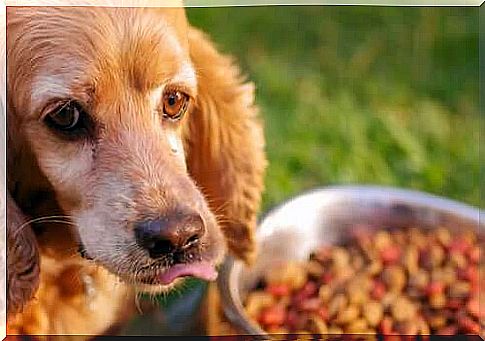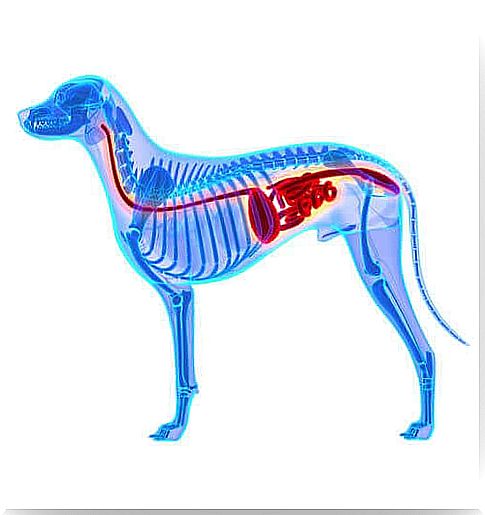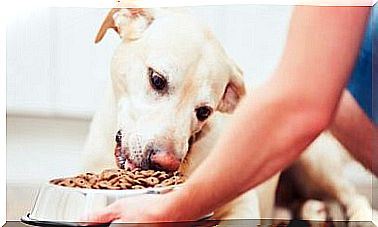Tips For Feeding Dogs With A Sensitive Stomach

Dogs with sensitive stomachs need some special care. Otherwise, this condition can lead to serious illness.
Dogs with a sensitive stomach can develop a wide range of symptoms, which include seasonal or respiratory allergies, itchy skin and coat problems. Episodes of diarrhea and the inability to gain weight are also frequent.
Likewise, it has been reported to be associated with diseases of the immune system such as arthritis, irritable bowel syndrome, diabetes and a host of other problems.
Leaky bowel syndrome as an underlying disease
The bowel walls are usually a permeable epithelium. That’s the secret to getting nutrients from food. Under healthy conditions, this permeability is selective, that is, there is strict control over which substances pass into the bloodstream from the intestine.
In cases of leaky bowel syndrome, bowel selectivity is lost. As a result, partially digested food fragments, as well as toxins and bacteria, are able to cross the intestinal barrier.

This increased permeability leads to digestion problems, such as incomplete nutrient absorption. In leaky bowel syndrome, there are compounds in the blood that the immune system identifies as foreign invaders.
Faced with this detected attack, the immune system is activated and responds with its usual weapons, thus causing inflammation and allergic reactions.
The challenge of feeding a dog with a sensitive stomach
Once intestinal damage is established, the dog’s body begins to perceive food as enemies. That’s why we see so many dogs that are allergic or reactive to almost all proteins and many vegetables and grains.
This leaves little choice in terms of food. The most important (and sad) thing about this condition is that the dog goes into a chronic and constant state of inflammation, discomfort and distress.
How to Treat a Dog with Leaky Bowel Syndrome?
The key to curing the leaky gut is to find out what can close that leak. Next, we’ll show you how to use food and some natural tips for caring for a dog with a sensitive stomach.
A three-step strategy is recommended:
- Eliminate inflammation
- Take advantage of your dog’s diet for treatment
- Putting the hyper-reactive immune system in tune
1. Eliminate inflammation
Some of the irritants most destructive to the digestive system are things we give our dogs regularly: vaccines and medications.
Vaccines challenge the immune system, forcing it to treat a disease in an unnatural way. Every year, our dogs’ immune systems are attacked by combined vaccines that force a confused immune response.
Consider spacing out vaccinations rather than vaccinating your pet annually. Without a doubt, the only exception is the rabies vaccine, which is regulated by law and must be administered at least every three years.
Currently, there is research showing that a single vaccine can actually protect your dog for seven years or more. To make sure of this, you can ask for a titer, that is, a blood test to check the levels of antibodies against the main diseases.
With regard to medications for fleas, ticks and worms, try using natural repellents during the cold seasons. If you’re administering flea and heartworm medications, it’s a good idea to follow up with a detox done using herbs such as milk thistle.

2. Enjoy the diet
The most damaging irritant to your dog’s gut is the diet itself. Processed and industrialized food and canned food are the cause of the suffering of many dogs with sensitive stomachs.
Its inert ingredients provide inadequate nutrition that is inflammatory, difficult to digest, and even potentially toxic. In fact, many of the ingredients in the feed put our dogs at risk for developing leaky bowel syndrome, in addition to obesity and allergies.
Feed can also be the indirect cause of other conditions, such as diabetes, arthritis and inflammation, irritable bowel syndrome, food intolerances and sensitivities, and nutritional deficiencies.
Thus, it is desirable to avoid excess carbohydrates, especially in the form of grains, processed foods and dairy products.
Fresh food is ideal for dogs with a sensitive stomach. This includes vegetables, fruits and meat, even raw. Your dog needs a diet full of live enzymes, bioavailable nutrients, protective antioxidants, healthy fats, abundant protein and immune stimulants.
- Meat: as long as they are rich in omega 3 and omega 6, so as not to cause further inflammation. You can include turkey, salmon, duck, deer and other wildlife. Wild fish are very welcome. Meanwhile, chicken and pork are excessively high in omega 6 and won’t help your dog heal.
- Vegetables: are a source of vitamins, minerals and fiber. Use green leafy vegetables such as broccoli, spinach and kale, and yellow-orange vegetables such as squash, peppers and carrots. Other possibilities include mushrooms, green beans, cauliflower, Brussels sprouts and cabbage. These options are low in carbohydrates and high in fiber, antioxidants, vitamins and minerals.
- Fruits: in small amounts, they can bring benefits. Blueberries, blackberries, raspberries, apples and many other fruits are excellent options. Always check that the fruit is safe for dogs before offering it to the animal.
3. Supplements to regulate the immune system
In addition to providing your pet with a balanced diet that suits your pet’s needs, also consider giving some natural supplements to regulate the immune system:
- Bone Broth : Bone Broth contains amino acids such as proline, glycine and L-glutamine, which are needed to heal the bowel.
- Prebiotics and Probiotics : These supplements contribute to the balance of good bacteria in your dog’s microbiome.
- Kefir : another source of probiotics. Use goat’s milk kefir or coconut water.
- Digestive enzymes: help break down food particles before they leave the intestine, thus reducing the symptoms observed.
- Turmeric : Turmeric is said to have anti-inflammatory, antibacterial and antifungal properties. Therefore, its consumption – within a balanced diet – is recommended.
- Ginger : stimulates digestive enzymes and increases bile production to improve digestive function.

Dogs with sensitive stomachs need a proper diet
Feeding a dog with a sensitive stomach implies an ongoing commitment. Feeding the dog on a healthy diet long enough for him to get better and then returning to processed products and snacks of any kind does not work. If you act this way, the owner will have to repeat the fight against the disease often.









